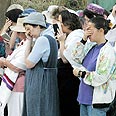
Prayers (Archive photo)
צילום: דן בלילטי
Battle over women's right to pray
Jerusalem synagogue 'Shira Hadasha' stirs controversy after permitting women to join minyan
In Israel the issue of women’s prayer is automatically associated with Conservative or Reform Judaism, but even in the large Orthodox community it has become fairly controversial, especially the inclusion of women in a minyan (prayer quorum).
At the center of the dispute is the Shira Hadasha synagogue in Jerusalem’s German Colony, whose members promote equality between men and women within the framework of Jewish law. The synagogue defines itself as Orthodox-egalitarian, and its members define themselves as Orthodox in every way. The men’s and women’s sections of the synagogue are separated by a curtain, with half the space given to the men and the other half to the women.
At Shira Hadasha women are called up to the Torah and read the Pesukei Dezimra (scriptural passages), as well as Anim Zemirot (the Hymn of Glory). Women also serve as cantors in situations in which a small child may be called up according to Jewish law. In other parts of the service, men serve as cantors.
'People should not pray in this synagogue'
But many rabbis don’t like this. Rabbi Ya’akov Ariel, chief rabbi of Ramat Gan and a prominent and well-respectd religious Zionist rabbi, recently ruled that “people should not pray in this synagogue.”
His decision resulted from a fear that this approach would spread to other Orthodox synagogues.
“One cannot come closer to God by violating Jewish law,” according to Rabbi Ariel, and while “women can come together in a private location to sing for themselves,” they should not “pronounce the blessings, read the Torah, etc., and not in a public place of prayer. One should not pray in a place in which prayer is conducted in violation of Jewish law.”
Rabbi Dov Lior of Kiryat Arba has stated that “anyone who is truly God-fearing will not join in such a minyan since this is how the breaking of Jewish tradition begins. Today they do this, and in the future the result will be women and men praying completely together.”
'Jewish Law Permits It'
What is the basis for Shira Hadasha’s approach to prayer? One basis is an article written by Rabbi Daniel Sperber, a recipient of the Israel Prize in Judaism. In a conversation with Ynet, Rabbi Sperber noted that “the members of the synagogue definitely define themselves as Orthodox, and for those who pray there it’s a wonderful place. I personally am not accustomed to this type of prayer. I’m used to praying in the conventional type of service, and by the same token I don’t pray in a Hassidic synagogue either. I think that Jewish law permits it, and this does not affect the legitimacy of the place.”
In his article Professor Sperber claims that the issue of human dignity supersedes the negative commandments, and also distinguishes between different synagogues. If there is a synagogue that does not feel that prohibiting women from being called up to the Torah is a moral problem, then it must not allow women to read the Torah. On the other hand, a synagogue that feels that this would be a violation of human dignity - that is, the dignity of women - must allow it. The congregants are entitled to make this decision for themselves.
Professor Sperber has no connection to Shira Hadasha, partly because he lives in the Old City of Jerusalem, and the German Colony is too far away.
He responded delicately to Rabbi Ariel’s verdict: “Among Jews there have been disputes throughout all the generations, but this doesn’t mean anything. The members of Shira Hadasha do not sit together, and everything done there has a basis in Jewish law, from the gemara and from the early sages. Perhaps it is not permitted for women to be called up to the Torah in all situations, but in some of them it is permitted. (Perhaps not for the first aliyah, the second aliyah, or the aliyah for the Cohen, but for the other aliyot it is permitted for women to be called up to the Torah).”
Jewish trend
This is becoming a trend: About 400 people come to Shira Hadasha for Sabbath prayers, and a similar synagogue was recently established in Modi’in. There are others in the United States and Australia as well.
Shira Hadasha tries to walk a fine line. The synagogue’s sexton, who asked to remain anonymous, stated that “in our synagogue we do treat women as a quorum, but on the other hand we don’t start the service before ten men arrive, for example. I don’t know Rabbi Ariel or his synagogue… Does he know women of our kind? Is he aware of the problems and the religious aspirations of women of our kind? As far as I’m concerned, we are doing an act of religious devotion.”
Rabbi Mendel Schapira, a German Colony resident, is a regular at Shira Hadasha. He defines himself as totally Orthodox, and has written an article on the subject of women and prayer. “Hundreds of people come to our services,” he says, “even graduates of yeshivas and girls’ seminaries.” He prefers not to comment on the verdict forbidding attending services at Shira Hadasha. “This is a synagogue where the congregants are people who are interested in religious development. We don’t want to harm anyone, and we don’t want others to harm us.”










